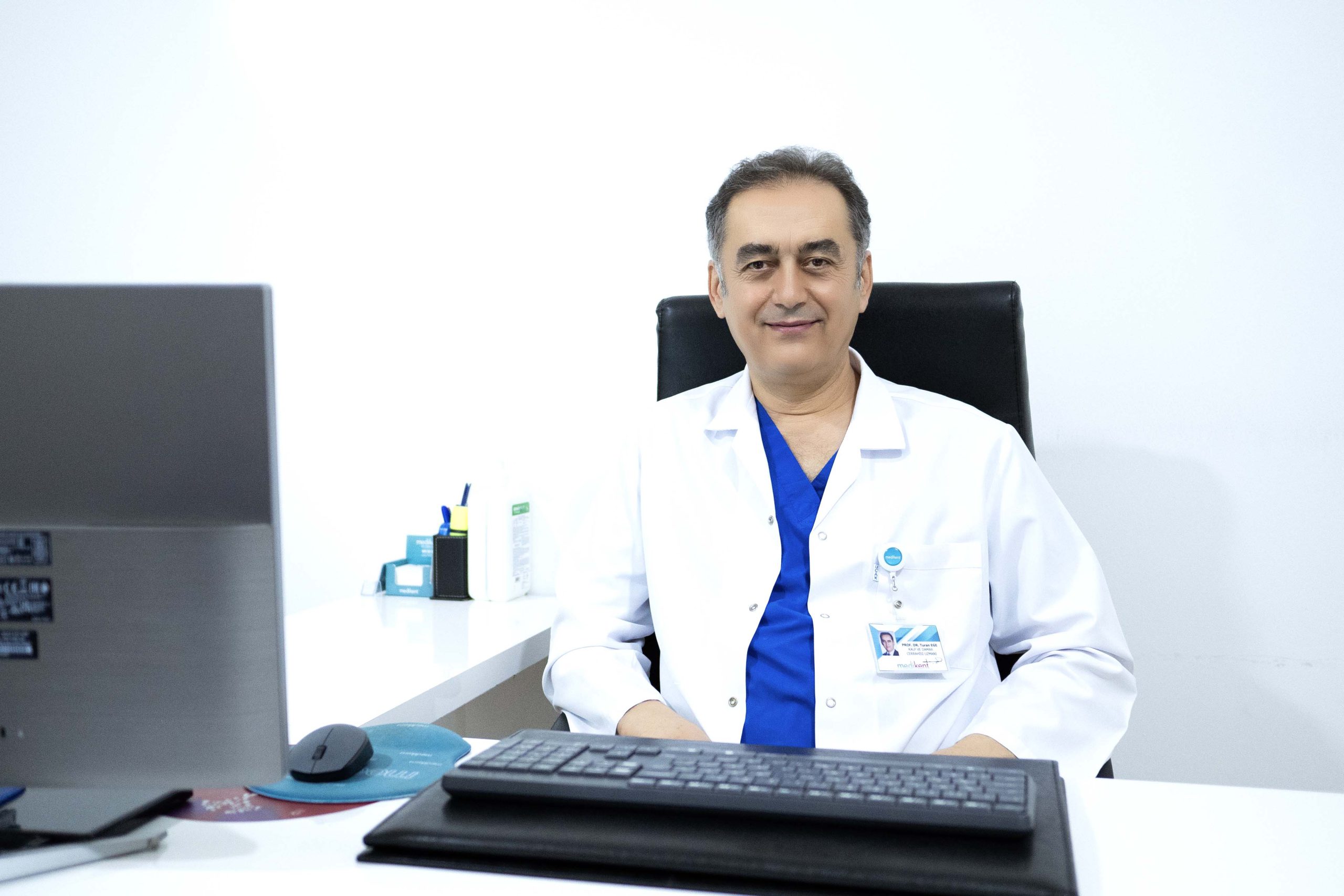Cardiovascular Surgery
As a team specialized in the diagnosis and treatment of cardiovascular diseases, we serve with the mission of protecting and improving the heart health of our patients.
Information and Appointment Line
e-Services

Cardiovascular Surgery Prof. Dr. Turan EGE
Heart and Vascular
Surgery
In the Cardiovascular Surgery Department of our hospital, coronary bypass surgeries, heart valve surgeries, aortic vein surgeries, carotid (jugular vein) surgeries, arm and leg vein surgeries, varicose vein surgeries and arteriovenous fistula operations are successfully performed by the team headed by Prof. Dr. Turan EGE.
Surgery Services
Heart Surgeries
Heart surgeries in our Cardiovascular Surgery Clinic are performed with or without the use of a heart-lung machine (by stopping the heart). The choice of these surgeries is based on the patient’s current illness and general condition.
Depending on the patient’s disease and general condition, minimally invasive heart surgeries are performed through small incisions made in different places without cutting the sternum.
Coronary Bypass Surgery
Coronary arteries are the vessels that supply the heart muscle with blood. As a result of narrowing or blockage of these vessels, the heart muscle is not adequately nourished and chest pain occurs. As a result of a complete blockage of the vessel, the heart muscle cannot be nourished and the clinical picture defined as heart attacks occurs.
The aim of coronary bypass surgery is to provide nutrition to the heart muscle by bringing blood to the coronary arteries that do not receive enough blood as a result of narrowing or blockage through different routes. This aims to improve the patient’s life expectancy and quality of life.
All current coronary bypass operation techniques are applied in our hospital. Although the duration of the operation varies depending on the number of bypass grafts to be made, it takes an average of 3-4 hours. After surgery, patients are transferred to the intensive care unit where they are followed up. Patients who have no problems in the intensive care unit are admitted to the ward and discharged after a few days of follow-up in the ward.
The patient’s chest vein (IMA), arm vein (Radial artery) and leg veins (Saphenous vein) are routinely used in coronary bypass operations.
Bypass operations performed in our clinic;
– Traditional coronary artery bypass surgery
– Coronary artery bypass surgery in beating heart (OPCAB)
– Minimally invasive coronary bypass surgery (MIDCAB)
Heart Valve Surgery
The heart has 4 valves. These are the mitral, aortic, tricuspid and pulmonary valves. These valves allow one-way flow of blood. In cases of stenosis or insufficiency, blood flow is impaired. In stenosis, blood cannot flow forward sufficiently because the valve opening is narrowed. In case of insufficiency, blood escapes backwards when it should be going forwards.
In valvular diseases, the first priority is to repair the patient’s own valve. In cases where repair is insufficient, the cover is replaced.
For valve replacements, there are two types of artificial valve. These are biological caps and mechanical caps.
Biological (bioprosthetic) valves are valves taken from animals and specially treated. Because of its low durability, it is preferred in special cases as the function of the cover starts to be lost after a while. It is used in young women who want to give birth or in elderly patients who may have difficulty taking blood thinners.
Mechanical covers; These are specially designed covers made of metal. They are long-lasting caps, widely used all over the world.
All valve surgeries are routinely performed in our hospital. In rhythm disorders (atrial fibrillation) due to valvular disease, a special method, radiofrequency ablation, is also applied in the same session.
Aortic Vessel Surgery
The aorta is the largest artery in the chest and abdominal cavity after exiting the heart. It gives the main branches that feed all the organs and limbs in our body.
Weakening of the aortic wall for various reasons can lead to excessive dilatation in certain areas. These enlargements are defined as aneurysms. When the aneurysm diameter increases above a certain level, aneurysm rupture (bursting) can occur. Therefore, aneurysms must be treated before they rupture.
Not all aneurysms need to be treated. In patients in whom enlargement has not reached a critical level, the risk factors that cause enlargement should be controlled first.
In patients in whom the enlargement has reached a critical level, one of two treatment options is applied.
One of these is the classical open surgical technique and the other is the closed endovascular treatment option.
Classical surgical treatment used to be a more common surgical treatment option. Nowadays, closed (endovascular) treatment is primarily preferred. This procedure is usually performed through small incisions in the groin with low risk. Open surgery is performed in patients in whom closed treatment is not feasible.
Carotid (Carotid Vessel) Surgery
Medikent Cardiovascular Surgery: Strong Heart, Healthy Future!
Heart Health in Expert Hands!
As Medikent Cardiovascular Surgery Unit, we offer specialized care for the cardiovascular system. With our experienced cardiac surgeons and modern surgical techniques, we are here to protect your heart health at the highest level and offer effective solutions to vascular problems. For a healthy heart and a healthy future, contact us now and book your cardiovascular surgery appointment!

